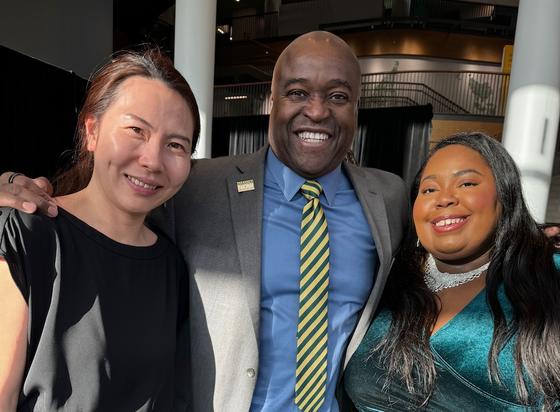SCHEV Visit Spotlights Mason’s Remarkable Success and Achievements
When state and tuition funding are combined, Mason receives more than $6,000 less per in-state student compared to the mean of its five doctoral peer institutions in the commonwealth. Mason is the largest and most diverse public four-year university in Virginia, and Washington emphasized its role as an innovation leader in the Washington, D.C., corridor, one of the nation’s major economic hubs.
“It’s incredibly important that the most technically rich and savvy region in the state have a major research institution that is supported, and supported at a high level,” Washington said during his presentation to SCHEV members on Tuesday morning in Merten Hall at the Fairfax Campus. “Not just the state depends on it. The country actually does as well.”
SCHEV meets six times per year, including twice on the campuses of public universities. Its two-day gathering this week was its first on a Mason campus since 2015.
Using data from a recent SCHEV “fact pack” analysis of Virginia’s public four-year institutions by Boston Consulting Group, Washington highlighted several Mason accomplishments with SCHEV members, including enrollment growth, acceptance and completion rates, affordability, efficiency, state economic impact, and other factors. Washington also cited the university’s state-leading rankings in innovation and social mobility and its emergence this year as a top-50 public university.
One of the fact-pack findings that made an impression on SCHEV officials was that 73% of in-state Mason graduates stay in Virginia—3% higher than public four-year institutions in the state—and 29% of out-of-state students remain in Virginia after graduation, 9% higher than the state average.
Washington encouraged SCHEV members to continue to produce data that provides an accurate portrayal of the value provided by Mason and the university’s importance to student success and commonwealth prosperity.
“We need advocacy, not just with the state government, but also beyond,” Washington said. “People listen to SCHEV. People outside of this state hear what you all say and that’s incredibly important. We need you focused on providing data to our institutions and state government so that our elected officials make decisions based on factual information.”
“The reality is we are in a global race for talent. And the winners of that global race will be those institutions that create…not just the very, very thin margin of the best minds, but many, many, many capable minds that can be focused on the global grand challenges. We believe that there’s not an institution better positioned in this state.”
The SCHEV meeting Tuesday also featured reports from its Student Advisory Committee, a group that includes student representatives from colleges and universities around the state. Committee co-chairs from Norfolk State, Central Virginia Community College, and William & Mary, as well as Mason Student Body President Paul Wyche, addressed campus safety, mental health, college affordability, and diversity, equity, and inclusion issues.
“Forty thousand students—40,000,” SCHEV chair Ken Ampy noted in his opening remarks Tuesday. “Outstanding growth here at George Mason. The second thing I will say is cyber security engineering. That program was the first of its kind in the country, and now other programs are modeled after it….Kudos again to the outstanding things going on here.”
On Monday, SCHEV members took a bus tour of the Fairfax Campus, led by University Libraries archivist Bob Vay. The tour concluded at the Enslaved People of George Mason Memorial for a talk by Mason integrative studies and history professor Wendi Manuel-Scott.

